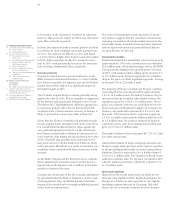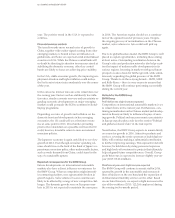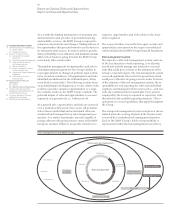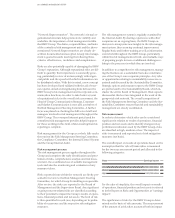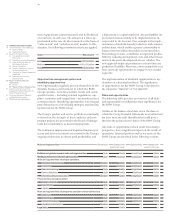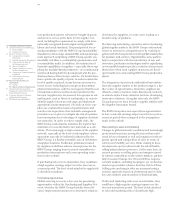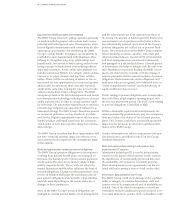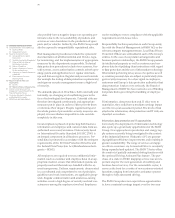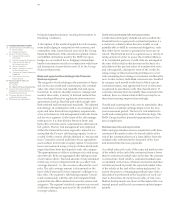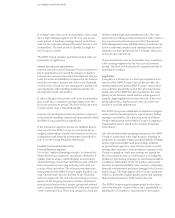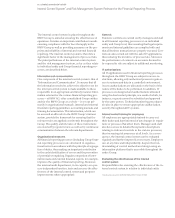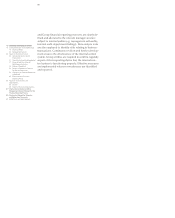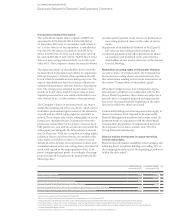BMW 2015 Annual Report Download - page 73
Download and view the complete annual report
Please find page 73 of the 2015 BMW annual report below. You can navigate through the pages in the report by either clicking on the pages listed below, or by using the keyword search tool below to find specific information within the annual report.73 COMBINED MANAGEMENT REPORT
and forecasted figures surpassed. Creating a successful
performance culture and developing the expertise and
skill sets of both staff and managers alike throughout
the organisation can also have a positive impact on both
revenue and profitability.
The BMW Group’s earnings can be positively affected in
the short to medium term by changes in the legal envi-
ronment. A possible reduction in tariff barriers, import
restrictions or direct excise duties could lower the cost
of materials for the BMW Group, also enabling products
and services to be offered to customers at lower prices.
Overall, strategic and sector opportunities capable of
having a positive and sustainable impact on earnings
are currently classified by the BMW Group as
insignifi-
cant
.
Risks and opportunities relating to operations
Production- and technology-related risks
Production stoppages and downtimes – in particular due
to fire, but also to manufacturing and control equipment
breakdowns or transportation and logistical disruptions
– pose risks against which the BMW Group has put suit-
able
measures in place. From the outset, production
structures and processes are designed with a view to
minimising any potential damage and its probability of
occurrence. The broad array of measures taken includes
technical fire protection solutions, land development
measures including contingencies against flooding, pre-
ventative maintenance, spare parts management on a
multi-site basis, and backup plans for alternative trans-
portation. The level of risk is also reduced by the deploy-
ment of flexible work-schedule models and employee
time accounts, but also by the ability to develop indi-
vidual models at additional sites if necessary, thus
en-
abling any backlog arising from production interruptions
to be clawed back within a short time. Moreover, risks
arising from business interruption and loss of production
due to fire are also insured up to economically reason-
able
levels with underwriters of good credit standing.
The development and production of technologically com-
plex
vehicles in high volumes is technically challenging
and a source of potential quality risks. In order to
achieve the outstanding level of quality expected of the
BMW Group’s products and minimise both statutory
and non-statutory warranty costs, it may possibly be
necessary to incur a higher level of expenditure than
originally forecast. There is also a risk of limited avail-
ability of products, particularly around the time of new
vehicle production start-ups. These risks are mitigated
through quality assurance activities in the form of
regu-
lar audits and the continual improvement of quality
management systems. The BMW Group also recognises
appropriate provisions for both statutory and non-
statutory
warranty obligations. These provisions reduce
the risk to the BMW Group’s earnings, a fact already
taken into account in the forecast. Further information
on risks in conjunction with provisions for statutory
and non-statutory warranty obligations is provided in
note 36 of the Group Financial Statements.
If risks from the production- and technology-related
risks category were to materialise, they could have a
high negative earnings impact over the two-year assess-
ment period. The level of risk attached to production-
and technology-related issues is classified as medium.
Production- and technology-related opportunities
Opportunities could arise as a result of product- or pro-
cess-related technological innovations, or from organi-
sational
changes designed to improve efficiency or
increase competitiveness. In the field of lightweight
construction, for example, carbon is being utilised in
high volumes for the first time in the automobile
indus-
try in the construction of the BMW i3. During the year
under report, the BMW Group went one step further
by introducing the use of carbon in the BMW 7 Series,
thereby generating competitive benefits in the form of
lower fuel consumption and better driving dynamics
through reduced vehicle weight.
Given the long lead times involved in developing new
products and processes, the BMW Group does not
expect these opportunities to have a material impact on
earnings during the forecast period.
Purchasing risks
Close cooperation between carmakers and automotive
suppliers in the development and production of vehicles
and the provision of services generates economic bene-
fits, but also raises levels of dependency. The increasing
trend towards modular-based production with a set
of common architectures covering various models and
product lines exacerbates the consequences of the loss
of an individual supplier or failure to supply on time.
As part of the supplier preselection process, the BMW
Group is careful to ensure that its future business part-
ners meet the same high ecological, social and corporate
governance standards by which the BMW Group itself
expects to be measured. The BMW Group Sustain-
ability
Standard, which contains a set of fundamental
principles and standards covering both production and



